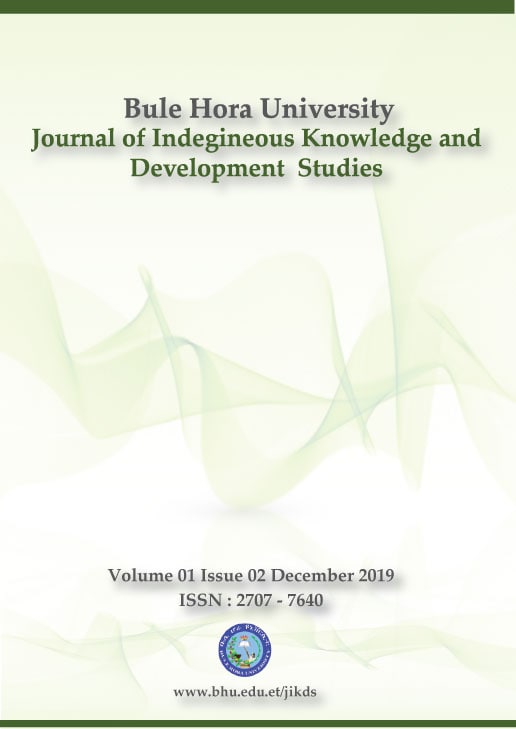Assessment of Farmers’ Indigenous Knowledge on Soil Conservation; a case of Karcha District; Southern Ethiopia
Keywords:
indigenous knowledge, soil conservation practices, soil erosionAbstract
Conservation of soil resources is important for sustainability of agriculture and environment. Due to anthropogenic and natural factors, this important component is under immense pressure and being deteriorating. However, soil conservation through indigenous knowledge practices is common in some parts of the world where the communities develops the norm of conservation practices and perpetuate from generation to generation. Thus, it is common to see different forms of soil conservation practices across the various indigenous societies of Africa where by Ethiopia is part and parcel. This study was all about assessing indigenous knowledge of farmers’ in soil conservation practices at karcha district, Southern Ethiopia. The district was purposely selected as it is well known in soil conservation relatively and has medium agro ecological condition. Stratified random sampling technique was used for the study considering soil conservation activities. The study adopted a sample design of 10% of 3203 total households which is 320. In addition, ten respondents for intensive interview (based on experiences and position) and fifteen respondents were selected for focus group discussion. Respondents from each kebele were selected by simple random sampling method. For this study, both primary and secondary data sources were used. The collected data was analyzed using SPSS (statistical package for social Sciences, version 20). Based on the data gathered, descriptive statistical tools like frequency and percentage were used. The qualitative data were thematically analyzed through description, narrating and interpreting. Types of indigenous practices encountered, Community perception and challenges diluting this knowledge were identified. Some of the identified indigenous knowledge was the cultures of manure making (15.9%), vegetation stripping (13.1%), mulching (12.8%), crop residues (12.2%), crop mixing (11.3%), crop rotation (11.3%), terracing (9.7%) composting (6.6%) and agro forestry. Identified challenges in the study area were: inappropriate planning (16.3%), lack of resources (14.7%), poor understanding about the application and role of indigenous knowledge practices (14.4%), unclear accountability (11.9%) and poor information access (10.6%). About 96.6% of the respondents argued that indigenous knowledge of soil conservation applied even though relatively low capacity building (47.2%) and low promotion (41.6%). It is apparent from the entire discussion that people of the study area have long year indigenous knowledge of conserving natural resources including soil. The finding of the study showed that indigenous knowledge of soil conservation practices was developed over a very long period of time and become their survival strategies in sustainable development based on the communities’ perception. The significance and importance of the practices thus lies beyond their contribution to land productivity and economic significance. Therefore, it is important to encourage the participants of this study in particular and others who have similar practices in general to enhance their indigenous knowledge through scientific ideas in order to capacitate them more.
Downloads
Published
Issue
Section
License
Copyright (c) 2019 Bule Hora University

This work is licensed under a Creative Commons Attribution-NonCommercial 4.0 International License.

